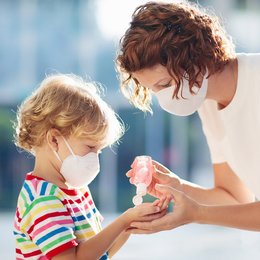Will the coronavirus mutate and can that make a meaningful difference in how it spreads?
Coronaviruses do mutate but very slowly compared to other viruses such as influenza. The mutant strain D614G has become dominant probably because it attaches to human cells better. There is NO evidence that it is more harmful.
— Dr. David Kaufman, medical director of infection control and antibiotic stewardship, Inspira Health
Is there any evidence of long-term health issues as a result of having had the virus (e.g. lung scarring, etc.)?
We do not fully know the extent of long-term health issues as a result of COVID-19. Preliminary data shows that many who have recovered from this virus have ongoing symptoms. Common complaints are fatigue, cough and shortness of breath, joint pains, chest pains and headache. Those with serious underlying medical problems and increased organ involvement appear to be more at risk of sequelae— a condition which is the consequence of a previous disease or injury— such as scarring to the lungs, seizures, strokes, cardiac muscle damage, blood clots and ongoing liver or kidney disease.
— Dr. Neha Vagadia, Virtua Pulmonology
How are hospitals better prepared today to be able to deal with a wave of cases vs. back in March when the pandemic started?
Our health care facilities and their teams are much better prepared than we were when COVID-19 first appeared in March— including more effective treatment protocols, enhanced infection control practices, well-defined testing processes and larger inventories of personal protective equipment, pharmaceuticals and ventilators.
As one of the nation’s first hotspots, New Jersey hospitals and their clinicians helped write the playbook on treating patients with this novel virus. We moved from ventilators to proning to some of the promising drug treatments like remdesivir and dexamethasone that we’re using today. The New Jersey Hospital Association held weekly interdisciplinary calls with clinicians across the state— physicians, nurses, respiratory therapists, pharmacists and others— to come together and share their experiences. The clinicians were extremely generous in sharing their knowledge, and these weekly calls became a forum that fostered evidence-informed practices that have advanced how we approach this novel virus— not only in New Jersey but across the country.
— Cathy Bennett, president and CEO, New Jersey Hospital Association
What is the risk of my young child getting sick with the virus?
The risk for children is predicated on exposure to other children and the general population. Adoption of safety practices such as wearing a face covering in pubic, social distancing and frequent hand washing of at least 20 seconds along with temperature checks when kids aren’t feeling well. COVID-19 is highly infective and is transmitted via droplet infection as well as fecal-oral routes, so the aforementioned measures maximize safety and also reduce risk.
— Dr. Kennedy Ganti, president-elect, The Medical Society of New Jersey
Different vaccines are in various trial phases. What does that mean exactly and how long could it take once the trials are completed to be administered to the general public?
Under normal circumstances, it could take up to twelve months for a vaccine to be available to the general public. Given the amount of money and time being invested into science to eradicate the Coronavirus, the vaccine would most likely be expedited. I expect a vaccine to be available in less than six months from now.
— Dr. Howard Hassman, chief scientific officer, Hassman Research Institute
Does a positive antibody test give you any type of immunity?
Currently, a positive antibody test does not ensure durable or long-lasting immunity. Therefore, there is no guarantee that you will not get the virus ever again. However, data is still emerging on this and, hopefully, we will know more in the future.
— Dr. Neha Vagadia
How come some people contract the virus but show no signs or symptoms?
This is the gift of evolution. Healthy people with intact immune systems are “designed” to survive all kinds of infections.
— Dr. David Kaufman
Will the virus disappear completely, or will it become something along the lines of influenza, where it exists but our immune response will be better conditioned?
It is likely that given the spread of COVID-19 resulting in over 7 million infections and over 200,000 deaths, there is a strong possibility that COVID is now endemic to the United States. This has not been determined by the Centers for Disease Control and Prevention or the National Institutes of Health and therefore is conjecture at this time.
— Dr. Kennedy Ganti
Can coronavirus be spread from human to pets and vice versa?
The virus has been reported in cats. How efficient they are as spreaders of virus is unclear.
— Dr. David Kaufman
With flu season approaching, what is the biggest challenge for people in trying to differentiate flu symptoms from those of COVID-19?
The biggest challenge is that many of the symptoms are the same for the flu and COVID-19 with few, if any, differences. Both can have symptoms of fever, cough, shortness of breath, fatigue, sore throat and headache. Loss of taste and smell appears to be more common with COVID-19. It will be difficult to differentiate and both the flu and COVID-19 can cause severe disease. That is why it is even more important for people to get their flu shot this year.
— Dr. Neha Vagadia
There have been other coronaviruses, what makes this one unique and challenging?
SARS-2 Covid 19 obtained genetic material from another coronavirus which enables it to efficiently attach to certain human cells in the lungs and blood vessel linings. The “common cold” coronaviruses do not attach to these cells.
— Dr. David Kaufman
Should I worry about clothes and shoes after I have been outside?
Experts have expressed that Coronavirus is thought to spread mainly by respiratory droplets but can survive on surfaces for varying periods of time. The virus does not survive well on soft surfaces such as clothing but can persist on clothes for up to 24 hours. If no one has tested positive for Coronavirus in your home, you can continue to wash and disinfect your clothes and shoes as you have before; taking all the necessary precautions.
— Dr. Howard Hassman
If a testing sample is taken early in infection, is it possible to test negative but still wind up having the virus?
The simple answer is yes. There may be a time when the viral load is not yet high enough to be detected but the virus may still be present.
— Dr. Neha Vagadia
Can you contract the virus more than once?
Yes, but this is extremely rare and documented convincingly in only one person in the world. The Centers for Disease Control and Prevention is looking very carefully at this.
— Dr. David Kaufman
Are there any medications I should avoid taking if I have COVID-19?
You should not stop any prescribed medications without consulting your doctor.
— Dr. Neha Vagadia
Click here to subscribe to the free digital editions of South Jersey Magazine.
To read the digital edition of South Jersey Magazine, click here.
Published and copyrighted in South Jersey Magazine, Volume 17, Issue 7 (October 2020).
For more info on South Jersey Magazine, click here.
To subscribe to South Jersey Magazine, click here.
To advertise in South Jersey Magazine, click here.












